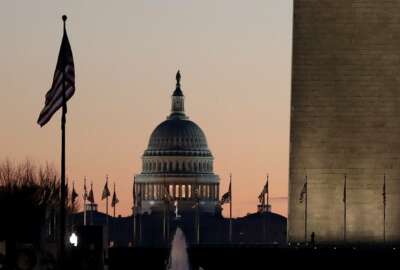
OPM answers some FAQ’s about surprise day off for feds
In today's Federal Newscast, the Office of Personnel Management makes some clarifications about President Trump's declared day off on Christmas Eve.
To listen to the Federal Newscast on your phone or mobile device, subscribe in PodcastOne or Apple Podcasts. The best listening experience on desktop can be found using Chrome, Firefox or Safari.
- Some clarifications have been made for the president’s surprise day off on Dec. 24. The Office of Personnel Management said the day off is paid and federal employees won’t be charged leave for the day. Employees who had previously scheduled leave for the 24th won’t be charged. Those who can’t reschedule use-or-lose leave before the end of the year will forfeit the time. Employees who work on the 24th will receive holiday premium pay. (Chief Human Capital Officers Council)
- Congress is urging the Social Security Administration to reinstate its telework program for operations employees. The 2020 minibus includes language instructing SSA to come up with a new telework plan. The agency ended its telework program for some 11,000 operations employees last month. SSA Commissioner Andrew Saul has said he made the decision to better address the agency’s ongoing customer service challenges. (Federal News Network)
- President Donald Trump moved quickly to fill a key cyber role at the Department of Homeland Security. Bryan Ware will be the new assistant director for Cybersecurity at DHS. Trump announced his intent to appoint him yesterday to replace Jeanette Manfra, who announced earlier this month that she is leaving for a private sector job in January. Ware currently serves as the assistant secretary for Cyber, Infrastructure, and Resilience Policy at DHS. In that role, he leads departmentwide efforts to reduce critical infrastructure risks, as well as focusing on cybersecurity, federal network security and countering cyber-crime. Ware also is a former CEO and chief technology officer at Haystax, a cyber analytics company. (White House)
- This week, 137 members of the Senior Executive Service were honored with Presidential Rank Awards. This year’s winners contributed groundbreaking research, discovered new star systems, modernized their agency’s IT systems, and managing during the longest government shutdown in U.S. history. Meritorious rank awards go to 5% of the SES. Distinguished rank awards go to just 1% of senior executives. (Federal News Network)
- The Small Business Administration is one step closer to new permanent leadership. The Senate Small Business Committee approved U.S. Treasurer Jovita Carranza to replace former SBA Administrator Linda McMahon, who stepped down in April. During her hearing, Carranza said she would focus on cybersecurity support for small businesses, and implement a women-owned small business certification program if confirmed. Her nomination now heads to the full Senate for a final vote. (Sen. Marco Rubio)
- It’s looking like the Space Force is going to become a reality, but the service may not be getting all it wants from Congress for the holidays. Congress is playing it safe when it comes to the newest military branch. The Space Force will only get about half of the $72 million it requested in 2020 under the spending deal unveiled by lawmakers earlier this week. The 2020 defense authorization bill establishes the new military service, which will treat space as a warfighting environment. Some lawmakers are still skeptical of the need for the force as its own entity. The spending deal reflect that by requiring the Air Force secretary to give Congress a month-by-month spending plan for the $40 million that would be appropriated to the service.
- It may be time to rethink the Defense Department’s top personnel role. James Stewart recently stepped down from serving as undersecretary of defense for personnel and readiness. The job has only been filled for eight months over the past five years. Military analysts like Todd Harrison of the Center for Strategic and International Studies and Mackenzie Eaglen of the American Enterprise Institute think the 2021 budget process is the perfect time for DoD to reconsider the undersecretary role. Harrison and Eaglen say there are too few qualified candidates for the role and the position is languishing in the vacancies. (Federal News Network)
- The armed services face a new lawsuit over former service members’s records. Under law, Army, Navy and Air Force boards have 18 months to decide on requests by veterans to have their service records corrected. The class action lawsuit claims the services routinely take much longer. The National Veterans Legal Service Program filed the suit in U.S. District court, saying lack of timeliness violates the administrative procedures act, and veterans rights to due process. A wrongful discharge status can deprive a veteran of services from the Department of Veterans Affairs.
- The Defense Department inked two helicopter contracts worth $1 billion combined. Boeing and Sikorsky Aircraft will each receive a little more than $500 million. Boeing will re-manufacture Apache helicopters to be used for foreign military sales. Sikorsky is getting paid for building new Black Hawks. (Department of Defense)
- The final two telecommunications service providers under the Enterprise Infrastructure Solutions contract received cybersecurity approval from the General Services Administration. GSA granted the authority to operate for MetTel and Granite Telecommunications, meaning all nine vendors now have met a key milestone under EIS. And on the heels of that approval, the U.S. Mint awarded MetTel a task order under EIS to consolidate existing contracts around a range of communications services. (General Services Administration)
- A bill aimed at encouraging federal agencies to adopt electric vehicles in their fleet has passed the Senate. The Charging Helps Agencies Realize General Efficiencies Act, would require the GSA to allow vehicle charge card to be used to pay for electronic vehicle recharging. Supporters say it will help save money on fuel. Sens. Gary Peters (D-Mich.) and Rob Portman (R-Ohio) the bill’s sponsors, said the bill would help the federal save money on fuel costs.
- A State Department employee and his wife have been indicted for selling counterfeit merchandise in the U.S. from a government computer at the U.S. embassy in Seoul, South Korea. The Justice Department said Gene Thompson set up online accounts on his government-issued computer to sell fake handbags back in the U.S. (Department of Justice)
Copyright © 2025 Federal News Network. All rights reserved. This website is not intended for users located within the European Economic Area.
Eric White
Eric White is news anchor and Federal Drive producer at Federal News Network.
Follow @FEDERALNEWSCAST
Related Stories
Related Topics
2020 NDAA
All News
Boeing
Bryan Ware
Department of Homeland Security
Donald Trump
Enterprise Infrastructure Solutions
Federal Drive
Federal Newscast
Gary Peters
General Services Administration
Granite Telecommunications
Jovita Carranza
Management
MetTel
NDAA
Office of Personnel Management
Pay & Benefits
Presidential Rank Awards
Rob Portman
Senior Executive Service
Small Business Administration
Social Security Administration
Space Force
State Department
telework
Workforce





